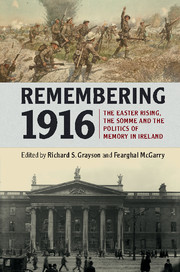Book contents
- Frontmatter
- Contents
- List of figures
- List of tables
- List of contributors
- Introduction
- Part I Memory and commemoration
- Part II Narratives
- Part III Literary and material cultures
- Part IV Troubled memories
- 11 Reframing 1916 after 1969: Irish governments, a National Day of Reconciliation, and the politics of commemoration in the 1970s
- 12 New Roads to the Rising: the Irish politics of commemoration since 1994
- 13 Ghosts of the Somme: the state of Ulster Loyalism, memory work and the ‘other’ 1916
- Index
12 - New Roads to the Rising: the Irish politics of commemoration since 1994
from Part IV - Troubled memories
Published online by Cambridge University Press: 05 March 2016
- Frontmatter
- Contents
- List of figures
- List of tables
- List of contributors
- Introduction
- Part I Memory and commemoration
- Part II Narratives
- Part III Literary and material cultures
- Part IV Troubled memories
- 11 Reframing 1916 after 1969: Irish governments, a National Day of Reconciliation, and the politics of commemoration in the 1970s
- 12 New Roads to the Rising: the Irish politics of commemoration since 1994
- 13 Ghosts of the Somme: the state of Ulster Loyalism, memory work and the ‘other’ 1916
- Index
Summary
Introduction: agreed history?
A visitor to the centre of Dublin on Easter Monday 2015 would have found the city en fete as tens of thousands accepted an invitation to ‘Step into History’ and experience ‘the sights and sounds of the capital in 1915’. The area around O'Connell Street had come alive with street theatre, music and vintage attractions as Dubliners in period dress promenaded past the General Post Office (GPO), the headquarters of the Rising, or joined walking tours of significant historical sites. However, if this was commemoration as a jolly family day out, there was also a serious side to the fun. Whilst some came along purely for a ride on the Edwardian carousel, probably just as many packed into venues like the Abbey Theatre or Liberty Hall to hear talks by leading historians about ‘The Ideas of 1916’ or discuss ‘The Irish Language and the Cultural Revolution’.
The spirit of Dublin's ‘Road to the Rising’ reflected many of the strands in the official Decade of Centenaries programme launched in 2011 to commemorate key moments in Irish history between 1912 and 1922. Speaking the language of reconciliation and peace-building, the Advisory Group on Centenary Commemorations proposed that the 2016 commemorations should acknowledge ‘the complexity of historical events and their legacy, and of the multiple identities and traditions which are part of the Irish historical experience’. Drawing on the discourse of ‘remembrance, reconciliation and renewal’, and stressing ‘inclusiveness and mutual respect’, these more conciliatory approaches seemed to stand in marked contrast to previous state-supported commemorations, which had been criticized for triumphalism and the glorification of revolutionary violence. As Anne Dolan observed in a recent essay on the relationship between history, memory and commemoration, ‘when has commemoration ever truly been about history? The memorial events for the fiftieth anniversary of the Easter Rising told us more about 1966 than they did about 1916, and 2016's efforts are not likely to be any different.’ In this light, every commemoration since 1917 has held up a mirror to its own times and preoccupations, and every decade has had the 1916 commemoration it deserved.
However, the dominant discourse of parity of esteem and building a shared history amongst all the ‘identities and traditions’ of Ireland did not go unchallenged at Easter 2015.
- Type
- Chapter
- Information
- Remembering 1916The Easter Rising, the Somme and the Politics of Memory in Ireland, pp. 224 - 240Publisher: Cambridge University PressPrint publication year: 2016



